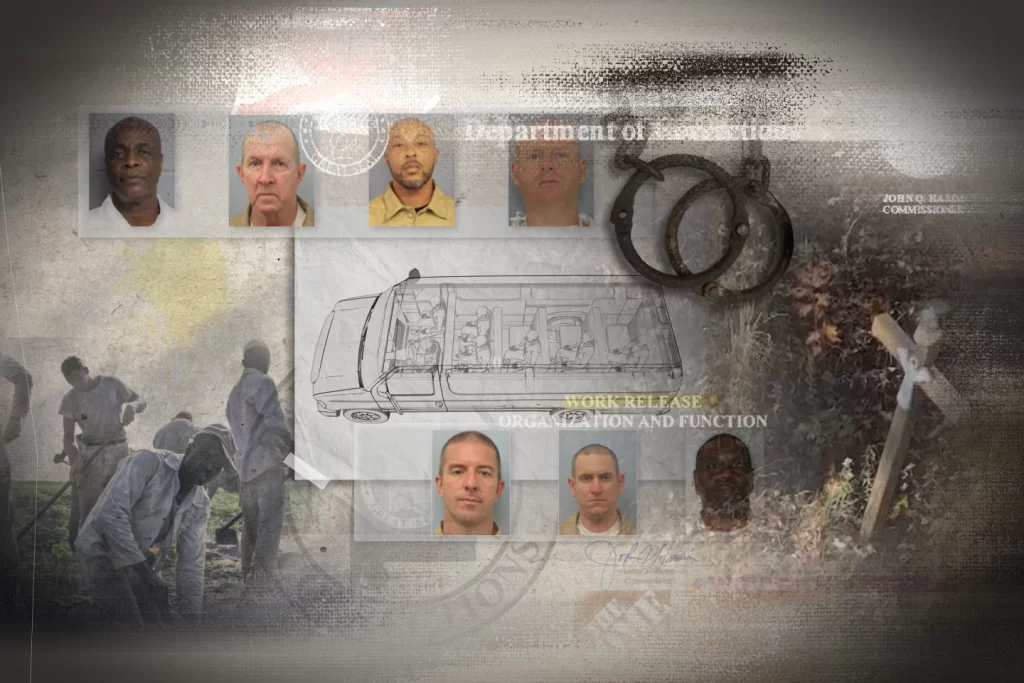
DADEVILLE, Ala.— A storm was looming when the inmate serving 20 years for armed robbery was assigned to transport fellow prisoners to their jobs at private manufacturers supplying goods to companies like Home Depot and Wayfair. It didn’t matter that Jake Jones once had escaped or that he had failed two drug and alcohol tests while in lockup — he was unsupervised and technically in charge.
By the time Jones was driving back to the work release center with six other incarcerated workers, it was pelting rain. Jones had a reputation for driving fast and some of his passengers said he was racing along the country road, jamming to music in his earbuds. Suddenly, the transport van hit a dip and swerved on the wet pavement, slamming into a tree.
Two men died after being thrown out of the van. And Jones, who was critically hurt and slumped over the blaring horn, had to be cut out of the vehicle. As the other men staggered into the storm to flag down help, they wondered: Why would the Alabama Department of Corrections place their lives in Jones’ hands?
“They knew he had a propensity to drink,” said Shawn Wasden, who survived the crash. “And they put him behind the wheel of a van anyway.”
No state has a longer, more profit-driven history of contracting prisoners out to private companies than Alabama. With a sprawling labor system that dates back more than 150 years — including the brutal convict leasing era that replaced slavery — it has constructed a template for the commercialization of mass incarceration.
Best Western, Bama Budweiser and Burger King are among the more than 500 businesses to lease incarcerated workers from one of the most violent, overcrowded and unruly prison systems in the U.S. in the past five years alone, The Associated Press found as part of a two-year investigation into prison labor. The cheap, reliable labor force has generated more than $250 million for the state since 2000 through money garnished from prisoners’ paychecks.
Most jobs are inside facilities, where the state’s inmates — who are disproportionately Black — can be sentenced to hard labor and forced to work for free doing everything from mopping floors to laundry. But more than 10,000 inmates have logged a combined 17 million work hours outside Alabama’s prison walls since 2018, for entities like city and county governments and businesses that range from major car-part manufacturers and meat-processing plants to distribution centers for major retailers like Walmart, the AP determined.
While those working at private companies can at least earn a little money, they face possible punishment if they refuse, from being denied family visits to being sent to higher-security prisons, which are so dangerous that the federal government filed a lawsuit four years ago that remains pending, calling the treatment of prisoners unconstitutional.
Though they make at least $7.25 an hour, the state siphons 40% off the top of all wages and also levies fees, including $5 a day for rides to their jobs and $15 a month for laundry.
Turning down work can jeopardize chances of early release in a state that last year granted parole to only 8% of eligible prisoners — an all-time low, and among the worst rates nationwide — though that number more than doubled this year after public outcry.
“It is a symptom of a completely, utterly broken system,” said Chris England, an Alabama lawmaker pushing for criminal justice reform.
Many prisoners work 40 hours a week outside their facilities and then get weekend passes, allowing them to go home without any supervision or electronic monitoring. So when prisoners are then told they’re too dangerous to be permanently released, England said, it looks like “another way to create a cheap labor force that is easily exploited and abused.”




